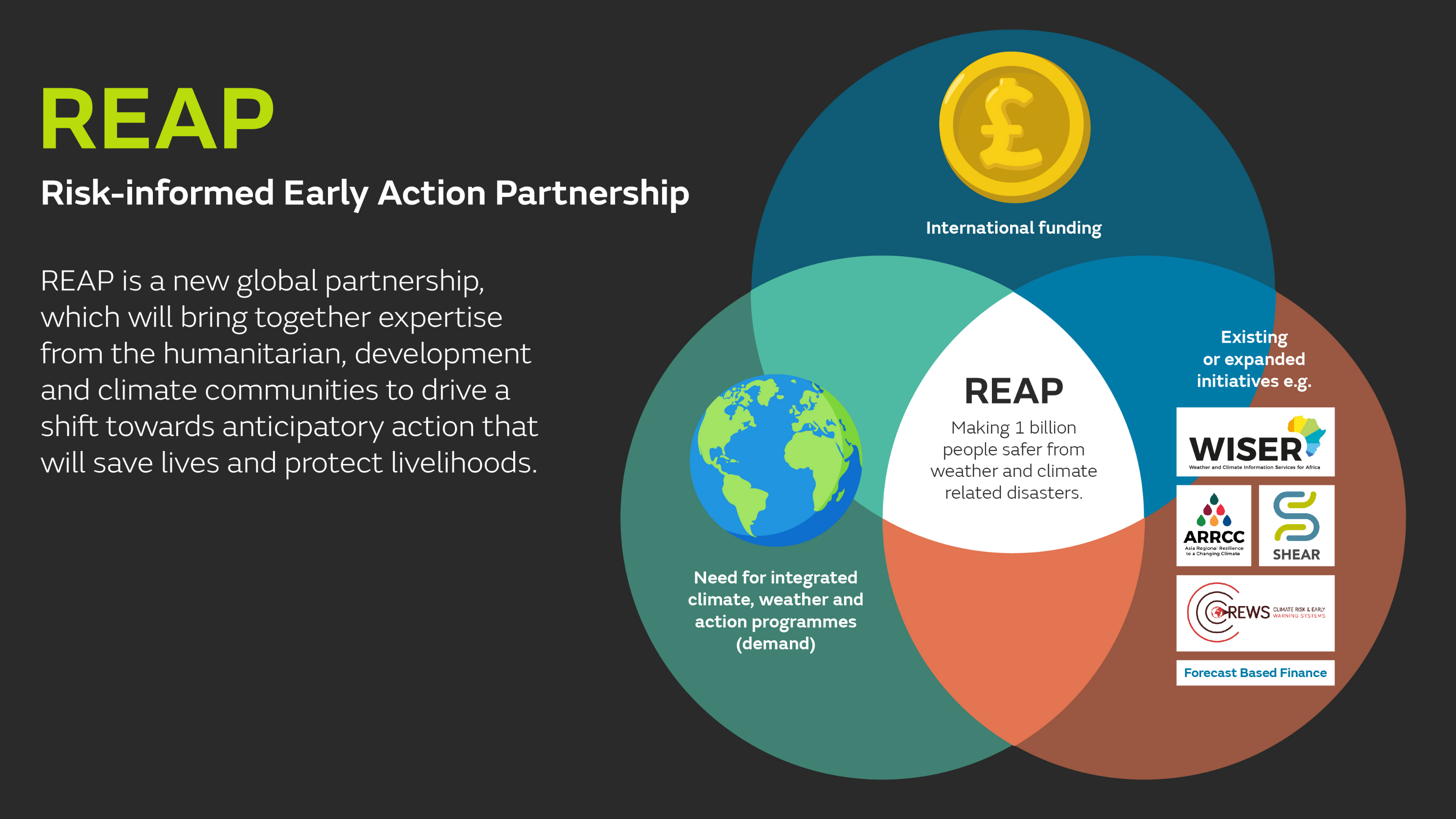New global partnership will make 1 billion people safer
Author: Press Office
16:00 (UTC+1) on Sun 22 Sep 2019
Met Office takes a leading role in an initiative that will bring together funding, knowledge and demand to save lives, protect livelihoods and improve efficiency and effectiveness of responses to weather and climate disasters.
The Risk-informed Early Action Partnership (REAP) has been launched at the United Nations Climate Action Summit in New York. REAP is an initiative combining expertise from across the climate, humanitarian and development communities with international funding and demand for services. Over 30 nations and organisations including the United Kingdom, World Meteorological Organization (WMO), International Federation of Red Cross (IFRC) and United Nations Development Programme (UNDP) have signed up to the partnership. On launch, the UK made commitments of £175 million to the targets of REAP.
In the past 20 years, 4.5 billion people have been affected by disasters, 90% of which are caused by weather and climate-related events. With a warming climate, instances of severe weather are likely to increase around the globe, making it ever more important to streamline the support available to vulnerable nations.
Through sharing best practice, lessons learned and expertise, it is expected that existing programmes and initiatives, which aim to address challenges concerning climate risk, will be better coordinated, scaled and therefore impactful. The Met Office is a co-author of the partnership and will have a representative on the technical management board. Many of the international programmes the Met Office oversees on behalf of UKaid will also be used to deliver the targets around the globe.
Helen Bye, Head of International Development at the Met Office, said: “This is an important step forward in bringing together the global effort to save lives end ensure sustainable livelihoods. By managing the demand and funding for ground-breaking climate early warning and action programmes, we can ensure that the greatest number of people possible around the world benefit.
“The target is for REAP to make one billion people safer from weather and climate-related disasters by greatly expanding early action mechanisms, improving early warning systems and the capacity to act on the risks they identify. This will save lives, protect livelihoods and improve the efficiency and effectiveness of response.”
REAP has four targets to reach by 2025:
- 1 billion more people are covered by new or improved early warning systems, including heatwave early warning, connected to longer-term risk management systems and backed by public awareness campaigns
- $500 million invested in early warning system infrastructure and institutions to target early action in ‘last/first mile’ communities, building on existing initiatives such as DFID’s WISER, ARRCC* & the CREWS programmes
- 50 countries to have reviewed and integrated their crisis/disaster risk management and climate adaptation laws, policies and/or plans to ensure that they reduce climate change impacts and exposure on people and the environment
- 1 billion more people covered by financing and delivery mechanisms connected to effective early action plans ensuring they are able to act ahead of predicted disasters
Although there are already notable efforts internationally to improve early action to reduce the impact from weather and climate disasters, there is still more to do. There has been an increase in funding for programmes but this is often fragmented. REAP seeks to fill that gap, bringing together existing international climate, humanitarian and development programmes to better coordinate and consolidate efforts by all stakeholders for the benefit of committed nations. This will leverage increased financial contributions, improve the way money is spent and combine and monitor targets.

Existing projects that will come under the umbrella of REAP such as the Weather and Climate Information Services for Africa (WISER) programme are already having real-time benefits for communities around the globe. WISER has, for example, supported the development of daily forecasts and maritime hazard warnings for Lake Victoria Basin, along with forecasts covering an area 50km from the shore. Not only has this saved lives of fishermen using sailing boats, but the wind forecasts are also improving catches as gusty winds stir up nutrients bringing fish to the surface. Elsewhere rain forecasts in Kenya have improved seed germination of arable crops, resulting in small-scale farmers claiming an increase in agricultural production of up to 20%.
REAP will strengthen efforts in countries to develop early warning systems linked to early action, contributing to scaling up or building on for example the CREWS initiative, and DFID-funded WISER and ARRCC programmes.


